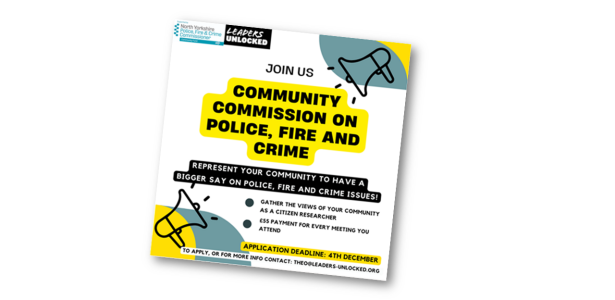Community Commission

The North Yorkshire Community Commission on Police, Fire, and Crime is a brand-new project aimed at fostering community engagement and inclusivity in decision-making processes.
The Community Commission is being funded as an independent project with Leaders Unlocked through the Commissioner’s Community fund.
Leaders Unlocked are a non-profit enterprise, enabling people to have a voice on key issues that affect their lives.
We are seeking adults from diverse backgrounds across North Yorkshire to become Citizen Researchers and to represent their local community.
We particularly encourage individuals from Black and Minority Ethnic (BAME) communities, religious communities, LGBTQ+ communities, traveller communities, women, individuals with additional needs, those with insecure housing or employment, and those with prior experience in the police or criminal justice system to apply.
As a Citizen Researcher on the Community Commission, you will become the authentic voice of your community, directly influencing the direction of police, fire, and crime-related policies.
Working closely with the Police, Fire, and Crime Commissioner, as well as the North Yorkshire Fire and Rescue Service and North Yorkshire Police, you will have a unique opportunity to raise community concerns and advocate for impactful changes.
Key Responsibilities as a Citizen Researcher:
- Conduct Peer Research: Organize and facilitate focus groups within your community to identify key crime and policing priorities.
- Collaborative Recommendation Development: Work closely with the Community Commission to develop crucial priorities and recommendations that reflect the needs of your community.
- Advocacy and Presentation: Present the Commission’s findings and recommendations directly to the PFCC and senior Police/Fire officers, advocating for positive, community-driven changes.
You will be supported in all these activities.
Join us in building a safer, inclusive Community.
This role requires a commitment of approximately five meetings and two peer research events, both in-person and online, between December 2023 and April 2024.
Interested? Contact: Theo@leaders-unlocked.org
